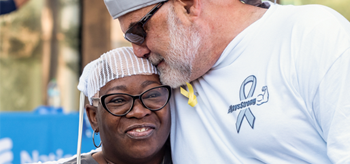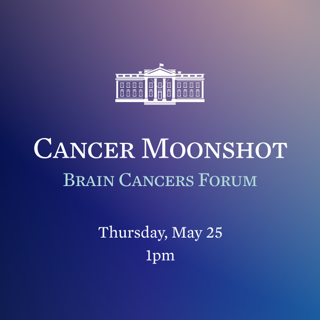Today, the National Brain Tumor Society (NBTS) will participate in the first White House Cancer Moonshot Brain Cancers Forum on Glioblastoma (GBM) & Diffuse Intrinsic Pontine Glioma (DIPG) during national Brain Tumor Awareness Month. In joining the forum, NBTS will affirm its pledge to defeat brain tumors and improve the lives of patients with brain tumors.
“Since the first launch of his Cancer Moonshot as then-Vice President Biden, NBTS has continued to promote the First Family’s themes of collaboration, commitment, and equity in all of our work,” said David Arons, JD, president and chief executive officer of NBTS, who will be participating in today’s event. “With the reignition of the Cancer Moonshot in 2022, we’re well-poised to build on these efforts and bring forth an ever more ambitious agenda of programs to deliver on our mission and the shared vision to end brain, and all, cancers as we know it.”
Today’s forum focuses specifically on the greatest challenges and opportunities that, if addressed, will result in achieving better outcomes for GBM and/or DIPG patients. Participants will share progress on work being undertaken, explore ways to accelerate efforts to develop innovative treatments, priority setting, and generate commitments that will be announced publicly to spur action, inspire hope, and serve as models for other rare cancers and diseases.
In participating in today’s forum, NBTS will share the unique perspectives of a patient advocacy organization with decades of experience funding research breakthroughs, championing critical public policy efforts, and supporting patients and families as they navigate brain tumor diagnoses. Also participating in the forum are patients, leading academic research institutions, cancer hospitals, federal agencies, biopharmaceutical companies, and other patient advocacy organizations.
“While great strides have been made to better understand adult and pediatric brain tumors, these are still cancers that have seen very little in the way of new treatments or improved survival or quality of life,” Arons continued. “In fact, pediatric brain cancer has surpassed leukemia as the leading cause of cancer related death in children in the U.S., and both GBM and DIPG have median survival times less than a year. Now is the time to build on government support for research and access to care for cancer patients, especially these devastating cancers.”
Mr. Arons will be joined at the forum by NBTS’s Danielle Leach, chief of government relations & advocacy, and NBTS board members Dr. Edjah Ndoum, Liz Salmi, and Adam Hayden, who will speak during the day’s opening session.
At the forum, and inspired by the Biden administration’s call to action to make public commitments to “spur action” and “imbue hope,” the National Brain Tumor Society is also making a multifaceted pledge to:
- Foster team science and data-sharing through its signature research platform, the DNA Damage Response Consortium, which is a collaborative effort with multiple leading hospitals and research institutions to testing and sharing data to advance an emerging class of drugs in various pediatric and adult glioma settings, including GBM and DIPG.
- Support and help advance pioneering research into extrachromosomal DNA (ecDNA), which has been found to aid rapid and aggressive malignant transformation in many tumor types, including GBM.
- Develop and expand an equitable ecosystem of care for pediatric brain cancer patients as partners with Duke University and Bayer Oncology in the Global Pediatric Brain Tumor Network. Using technology from the NIH, this effort will enable hospitals across Africa and India to connect with U.S. hospitals to match pediatric patients to neuro-oncologists, clinical trials, potential treatments, and importantly to organizations that may be able to help close geographic, financial, and cultural barriers, while generating high-quality clinical data to better understand patient experience and outcomes.
- Continue promoting patient-centered clinical trials, including hybridized/decentralized trials, that increase access for all Americans to participate in cutting-edge research exploring innovative treatment options.
- Advocate for improved network adequacy in health insurance plans.
Glioblastoma is the most common malignant (cancerous) brain tumor, accounting for approximately half of all primary malignant brain tumors. These tumors are also the most aggressive, complex, difficult to treat, and deadly type of adult brain tumor. Approximately 14,490 new cases of glioblastoma will be diagnosed in the United States in 2023, and it’s estimated that more than 10,000 individuals in the U.S. will succumb to their disease this year. The five-year survival rate for glioblastoma patients is only 6.9%, and the median length of survival is only 8 months. These rates have changed little during the past 30 years.
DIPG is a name given to a group of lethal grade 4 tumors occurring in the pons region of the brain stem. These tumors occur primarily in children. In 2016, the World Health Organization reclassified these tumors as “diffuse midline glioma, H3 K27M-mutant.” They account for approximately 75% of brain stem tumors in children, and median survival is estimated at less than a year. There have been more than 250 clinical trials that have failed to meaningfully improve survival compared with radiotherapy, the current standard of care, in patients with DIPG in recent years.
The White House Cancer Moonshot Brain Cancers Forum will take place from 1:00-5:00 p.m., and will include a live-streamed public session from 1:00-2:00 p.m., followed by closed breakout sessions for invited guests the remainder of the afternoon.




